Search results for :
Top MBA Recruiters: Breaking Into Personal Care Empire L’Oreal
Considered by many as the world’s top beauty brand, L’Oreal is well known for its well-known fragrances, hair, nails, makeup, and skincare products, with a portfolio boasting legendary brands like Maybelline, Garnier, Redken, and Ralph Lauren. Headquartered in Clichy, Hauts-de-Seine, France, the company has also become a surprisingly strong top MBA recruiter. Lets take a look at what business school students need to know about the personal care empire.
Bloomberg Businessweek Best Business Schools Ranking

The 2019 Bloomberg Businessweek best business schools ranking is a modest departure from it recent versions. The new version solely analyzes U.S.-based business schools, largely formulated around career outcomes of its students, rather than the individual experiences of those students during their respective educations. The publication analyzed "more than 26,804 surveys of MBA students, alumni, and recruiters, as well as employment data provided by schools, we created four indexes: Compensation, Learning, Networking, and Entrepreneurship."
To get a more in depth look at the entire ranking, head on over to the official Bloomberg Businessweek website.
For the second year in a row, the Stanford Graduate School of Business managed to secure the top overall spot in the Bloomberg Businessweek ranking, thanks to the school's nearly unbeatable marks in entrepreneurship and post-graduate salaries (with nearly perfect scores for both).
The publication awarded Stanford GSB a perfect score overall, ranking first in graduate compensation and entrepreneurship. The Bay Area's school rank came in spite of its modest learning scores, coming in just 29th overall.

The biggest surprise in the top 10, all the way in second overall in the 2019 Bloomberg Businessweek ranking, is the Dartmouth College Tuck School of Business.
Clocking in last year at 19th overall, the next-tier jump for the New Hampshire business school not only represents one of the biggest leaps in this year's ranking, but one of the highest jumps for an elite school we may have ever seen. The school earned the highest overall grade when it comes to networking capabilities, in addition to top five scores in compensation and learning experiences.

For those familiar with any MBA or business school ranking, it would be pretty surprising to find Harvard Business School anywhere outside the top five. And despite Bloomberg Businessweek changing its ranking system, HBS still managed to secure the third overall spot for the second consecutive year.
MBA graduates from the prestigious school most frequently earn roles in the finance industry, at a recent rate of around 19.8 percent, followed closely by consulting (16.6 percent) and tech (12.7 percent). Nearly all HBS MBA grads earn average annual salaries at or around $100,000 USD, with those in consulting and finance typically getting the most, at around $150,000.

The perennially top-ranked Chicago University Booth School of Business earned the number four spot on the 2019 Bloomberg Businessweek ranking. This comes afte the Windy City business school earned the top overall spot in both The Economist and Forbes' rankings.
More than half of recent Chicago Booth MBA grads earned roles in either consulting or finance, with employees in the former earning the highest average annual salary; around $150,000 USD.

Like Dartmouth Tuck, the University of Virginia Darden School of Business saw a sizable jump in the 2019 version of the Bloomberg Businessweek ranking, moving up from ninth last year to the top five. The Charlottesville business school is also the highest ranked public school represented in this year's ranking.
Unlike the four schools that precede UVA Darden on this year's ranking, the school earned remarkably high grades when it comes to learning experience, placing second overall.

The Wharton School at the University of Pennsylvania, a typical mainstay in any business school ranking, earns the sixth overall spot in this year's Bloomberg Businessweek ranking, thanks in part to two major score contributors: compensation and networking
For compensation, the Philadelphia metro school tied with Stanford GSB for first overall in the U.S., while networking came in a strong 10th overall. These scores managed to leverage Wharton near the top of the 2019 rankings despite paltry scores in learning experience (70th overall), and entrepreneurship (31st). Because of these marks, Wharton dropped slightly from its 2018 mark of 2nd overall.

MIT's Sloan School of Management, the second-highest ranked Boston metro business school on the 2019 Bloomberg Businessweek ranking, earns the seventh overall spot thanks in part to high marks in compensation (fourth) and entrepreneurship (third).
Like most of the top-ranked schools on this list, graduates in consulting typically earn the highest annual salaries, with employees in the industry taking home around $147,000 USD on average per year.

The UC Berkeley Haas School of Business, the second-highest ranked business school in the state of California on the newest Bloomberg Businessweek ranking, maintains its spot in the top ten thanks to its remarkably well-rounded grades.
While many schools on this ranking were boosted by high compensation and networking grades, Haas' eighth overall placement comes with top 20 grades across the board in compensation (tenth), learning (18th), networking (13th), and entrepreneurship (fourth).

The highest-ranked business school in New York City, Columbia Business School, comes in at ninth overall on the newest Bloomberg Businessweek ranking thanks to boisterous scores in compensation (sixth overall) and networking (seventh).
The school's ideal locale offers some unique career opportunities for its MBA graduates. Like many of the Ivy League fare on this list, consulting leads the way in terms of average annual compensation, but CBS graduates are typically among the most prolific earners in the media industry as well, with an average annual salary around $120,000 USD.

The final spot in the 2019 Bloomberg Businessweek top 10 goes to Northwestern University's prestigious Kellogg School of Management—the second highest-ranked Chicago metro school on the annual list.
Like the aforementioned Columbia Business School, Kellogg Midwest location offers multiple career avenues that the coastal schools may not, including a potentially lucrative ($120,000 USD) role in the manufacturing and healthcare ($122,000) industries.

Should a Business School Scholarship Impact Your MBA Choice?
A brief look at Clear Admit MBA DecisionWire appears to indicate that more and more leading MBA programs are offering scholarship money, either need-based or merit-based, to encourage admitted candidates to enroll. This may be the result of competing for a smaller pool of top applicants amidst declining application volume (particularly in the USA and Europe).
This scholarship money reduces the price of the MBA, and therefore alters the calculus in terms of the cost-benefit analysis of the program. If you do have admissions offers from multiple programs, some of which include scholarship money, you will need to weigh whether the reduced cost alters your order of preference for schools.
Cases where scholarship dollars can alter your order of preferences include:
- Career Goal Impact: When your career aspirations, both short-term and long-term, are not impacted by choosing the program that would be from a lower-tier. For example, you are not seeking a career in consulting at the elite consulting firms, which generally focus their recruiting at the very top schools. Nor are you seeking opportunities in private equity and venture capital – jobs in this field are scarce and very much limited to top schools with strong networks in the domain. Perhaps you know where you plan to be post-MBA regarding geography, and the school that is offering you scholarship has a significant alumni presence in that region which would facilitate achieving your goals.
- Scholarship Prestige: The scholarship award is prestigious at the school, and offers you opportunities at that program that are not available to the general student body. For example, you may have access to a special mentor program. A ‘named’ scholarship is also something you can place on your resume, helping you to stand out from other students at the school. These advantages might be enough to sway a decision in favor of a lower-tier program, but they are only really compelling if your recruiting goals are not geared towards the firms that concentrate their hiring at the very top programs, as noted above.
Fundamentally, it is important to weigh a scholarship offer from both a short- and long-term perspective. While it might be compelling in the short-term to graduate from your MBA program with $100,000 less in debt thanks to a scholarship, that $100,000 in savings, discounted over a 40 year post-MBA career, may be small compared to the better career opportunities afforded by a more prestigious MBA program. This is exponentially more important when your career goals are targeting the high-paying careers of consulting, banking and tech – not to mention that those jobs often come with significant signing bonuses which can instantly help with some of those tuition loans. However, if your career is targeted to social impact and non-profit, and other careers that generally don’t pay as high a salary, the value of the scholarship, and reduced debt upon graduation, is more appealing.
Finally, if you are an international student, you need to factor in your desire to remain in the country or region of your MBA program, and how important that is, based on your potential to earn the same salary in your home country. A number of international students are using the MBA to help them relocate, but given the current immigration environment, the potential for doing this may be more limited. A scholarship, lowering the cost of the MBA, reduces the risk to the student who has to return to their home country upon graduation. The counter argument is, the more prestigious the MBA program to which you gain admission, the greater your opportunity of getting an offer that allows you to remain in the country of the MBA.
Overall, it can be tempting to jump at a substantial scholarship – especially when the loans one takes for an MBA program seem truly daunting. But in the end, just as with investing in the stock market, a long view is needed when computing the true value of such scholarships.
This article has been edited and republished with permissions from our sister site, Clear Admit.
Your Essential Guide to Pre-MBA Diversity Conferences, Boot Camps, and Forums
Several organizations are focused on helping increase the pipeline of underrepresented demographics—such as women, LGBTQ students, and those from diverse cultural and ethnic backgrounds—to business school and the larger business world. As part of these efforts, many host MBA diversity conferences, boot camps, and forums providing recruiting and networking opportunities to admitted students headed off to business school in the fall. For eligible participants, these opportunities, designed to provide a head start for students in the MBA recruiting process before they even arrive on campus, are well worth pursuing.
Forté MBA Women’s Leadership Conference
 The Forté Foundation, a non-profit consortium of leading companies and top business schools, works specifically to expand opportunities for women in business through a range of financial and educational opportunities. A centerpiece of these efforts is the annual Forté MBA Women’s Leadership Conference, which will take place this year in Atlanta on June 15 and 16. Registration is now open for both current business school students and those slated to start their MBA programs next fall.
The Forté Foundation, a non-profit consortium of leading companies and top business schools, works specifically to expand opportunities for women in business through a range of financial and educational opportunities. A centerpiece of these efforts is the annual Forté MBA Women’s Leadership Conference, which will take place this year in Atlanta on June 15 and 16. Registration is now open for both current business school students and those slated to start their MBA programs next fall.
The two-day conference provides an opportunity for women pursuing their MBA to connect with hundreds of other like-minded students. Billed as a chance to “learn from highly successful business leaders how to develop stand-out skills and project an authentic leadership style,” it also presents valuable networking opportunities. Highlights of this year’s conference include a meet and greet with Fortune 100 recruiters, more than 150 speakers and presentations from a variety of industries and career paths, and a keynote lecture by USA Today Editor-In-Chief Joanne Lipman. Conference attendees can also take part in the Forté Power Pitch Competition, pitching their ventures to a panel of judges for a chance at cash prizes.
Reaching Out MBA Conference
 LGBTQ+ students and their allies should familiarize themselves, if they are not already, with Reaching Out MBA (ROMBA). This organization focuses on educating current and prospective MBA students on LGBTQ-specific issues and connecting current LGBTQ students with each other and with alumni communities.
LGBTQ+ students and their allies should familiarize themselves, if they are not already, with Reaching Out MBA (ROMBA). This organization focuses on educating current and prospective MBA students on LGBTQ-specific issues and connecting current LGBTQ students with each other and with alumni communities.
“The conference connects more than 1,600 members of the LGBTQ MBA student and alumni community with more than 90 companies looking specifically or LGBTQ talent,” ROMBA Executive Director Matt Kidd explains. Registration is now open for this year’s conference, which will take place in Minneapolis on October 4th through 6th.
ROMBA also helps prepare students in advance of the conference. “We want to ensure they are well positioned for their conversations with our corporate partners at the conference and beyond,” Kidd adds. ROMBA also offers pre-admission mentoring, a summer consulting project, and webinars designed to help students gain a full understanding of the industries represented at the conference.
MBA JumpStart
 Unlike Forté and ROMBA, which focus on specific student demographic groups, other organizations offer pre-MBA opportunities for students from a range of diverse backgrounds. One such organization, JumpStart Advisory Group (JSAG), provides an array of resources and tools through its ongoing Diversity Forums.
Unlike Forté and ROMBA, which focus on specific student demographic groups, other organizations offer pre-MBA opportunities for students from a range of diverse backgrounds. One such organization, JumpStart Advisory Group (JSAG), provides an array of resources and tools through its ongoing Diversity Forums.
JumpStart will host its Brand Management and Marketing Diversity Forum in Philadelphia on May 20th and 21st and its Financial Services and Consulting Diversity Forum in Chicago from July 10th through 13th. In Chicago, finance will be the focus on Tuesday and Wednesday and consulting on Thursday and Friday, although enrolled students interested in learning about both industries can choose to attend the entire event.
“Selected students from top-tier MBA programs attend industry-specific workshops, are introduced to case studies, and are provided with endless opportunities for networking with corporate partner representatives and other incoming MBA students prior to matriculation,” according to the JumpStart website. Students interested in attending should apply here by May 13.
“Diversity for MBA JumpStart is defined as individuals that are under-represented in business including women, Black, African-American, or of African descent, Hispanic, Latin-American, or of Latin descent, Native American or American Indian, Asian and Pacific Islander,” the website notes.
School-Year Fellowship Opportunities
In addition to pre-MBA conferences and workshops, students from diverse backgrounds can also apply for a range of fellowship opportunities once they have been admitted to a leading MBA program.
The Toigo Foundation, which is focused on the finance industry, aims to prepare under-represented MBA students for leadership roles and help foster environments where diverse students can thrive during and after their MBA. Recipients of the Toigo Fellowship participate in two weekends of intense training during each year of their MBA program. These training sessions include leadership development and mentoring, networking opportunities, and the chance to make lasting connections across a range of financial industries. Applications are due by April 30, and financial awards vary depending on achievement and financial need. “The selection of each year’s class of Toigo Fellows is a fluid process and not limited to a specific number,” notes the Tioga website. “Recently, we have selected as many as 80 students (from our applicant pool of nearly 400) to become Toigo Fellows.”
In addition to the nonprofit organizations listed above, many well-known corporations also offer fellowship programs of their own that include financial assistance, conferences, and bootcamp-style experiences for students of color, LGBTQ students, and students with disabilities.
For example, Bank of America Merrill Lynch offers a $40,000 fellowship toward first-year tuition as well as a paid summer internship and opportunities for additional funding in the second year of business school. Goldman Sachs features a similar MBA fellowship program that provides funding to cover first-year tuition, a guaranteed summer associate salary, and a signing bonus that carries an additional $40,000 award upon acceptance of a post-MBA full-time offer. To learn about even more corporate MBA fellowship opportunities, click here.
Now, we understand completely that the thought of another application process on the heels of applying to business school may seem groan-worthy to many. But for students from diverse backgrounds, exploring the opportunities presented as part of these pre-MBA diversity conferences, boot camps, forums, and fellowship programs can certainly make the additional effort pay off.
This article has been edited and republished with permissions from our sister site, Clear Admit.
The Stanford MBA Job Journey, and More – San Francisco News
Want to stay on top of the latest business school news out of Silicon Valley? We’ve got your San Francisco news covered!
Exploration Helped Her Find the Right Hands-On Job — Stanford GSB School News
Celina Johnson, Stanford GSB MBA ‘08, is currently the COO of Man Crates, a San Mateo-based company that sells gifts for men. But these aren’t just any typical gifts—they are special presents enclosed in wooden crates that recipients have to open with a crowbar. Meanwhile, gift cards come in concrete bricks that must be smashed; certainly not your average Pollyanna affair.
In a recent interview with her alma mater, she discusses not only her current role at Man Crates, but also also how her experience at Stanford helped get her there.
“In my first meeting with the Stanford GSB Career Management Center, they asked me what my goal was, and I said I wanted to work ‘at a company.’ I knew that I wanted to move out of investing. I loved the strategic part of it, but I felt that something was missing. I wanted to roll up my sleeves and execute,” Johnson says.
Johnson graduated right before the peak of the Great Recession, which, thankfully for her sake, didn’t seem to hamper her career outcome. Her first role after earning her degree was with Sears-owned Orchard Supply Hardware, which had a headquarters in nearby San Jose. She left after five years, saying “If investing was a lot of strategy and not enough execution, Orchard was a lot of execution and not enough strategy.”
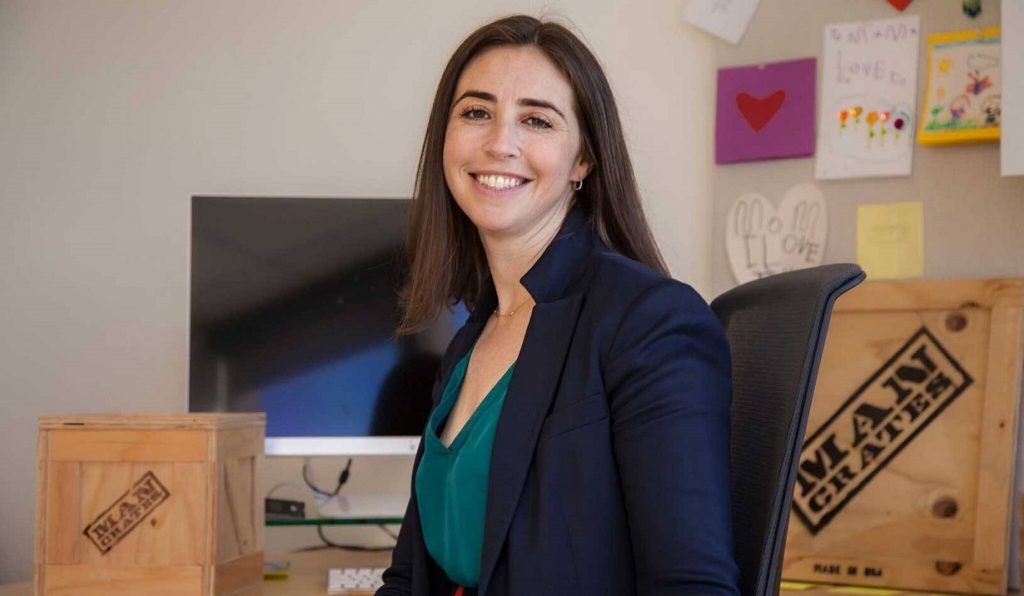
Stanford ’08 MBA alum Celina Johnson, COO of Man Crates / Photo via Emily Billings
Rather than working from the ground up, Johnson felt her particularly skills were best utilized in a “company that already had product-market fit where my skills could be applied to improving the business.” Months after her Orchard Supply Hardware departure, she connected Stanford ’09 MBA alum Jonathan Beekman, who had already begun growing his Man Crates team.
You can read more about Johnson’s journey here.
Delphine Sherman Named as Haas Chief Financial Officer — Haas School News
Delphine Sherman, who graduated from the UC Berkeley Haas School of Business with an MBA in 2006, has been named as the school’s new chief financial officer. An expert in the areas of education and financial management, Sherman told her alma mater that she is excited to take on the challenges of her new job.
“It’s a very exciting time to see how far the school has come during this really challenging financial time at the university,” she said. “I’d love to capitalize on that and bring in some strategy around what we want our long-range plan to look like—diving into the long-term and where we go from here.”
Learn more about Sherman and her credentials here.
SCU’s McChesney to Lead Jesuit MBA Network — Leavey School News
Toby McChesney was recently named the chair of the Jesuit MBA Network (JEBNET) — a worldwide network made up of 27 AACSB-accredited Catholic, Jesuit institutions and three Catholic institutions, works towards helping people earn their MBA. McChesney led the graduate programs at the Santa Clara University Leavey School of Business over the past 18 months as the school’s senior assistant dean for graduate business programs. As chair, McChesney will lead these meetings and become the face of JEBNET.
“I am honored to be selected as the chair of JEBNET where I can use my expertise to ensure that the group continues to thrive in graduate management education,” said McChesney, who will serve a three year term. “I look forward to working closely with other Jesuit business school leaders in ways that will benefit the entire network over the next three years.”
Learn more about McChesney and JEBNET here.
How Virtual Work Can Learn from the Virtual Classroom
Sponsored Content
How do you connect a workforce spread across different cities, countries and continents?
Finding the answer to that question is among the biggest challenges and opportunities for modern organizations—businesses, non-profits and academic institutions alike. Virtual collaboration and telecommuting are nothing new, but the technology that supports these practices is evolving faster than it ever has before. In fact, the first trend in Deloitte’s 2017 Global Human Capital Trends report indicates that the constant pressure to adapt to digital transformation and create “the organization of the future” is the most important challenge facing executives around the world.
Virtual collaboration is rapidly becoming important in the academic world as well, with leading schools like USC Marshall offering mostly online education programs, including its top 10 online MBA program. These programs challenge and teach students to learn, collaborate and communicate more effectively in virtual classrooms as well as in business settings.
Deloitte also makes the point that individuals usually adapt to technology quickly, while organizations take longer to adapt to changes in technology. As a result, there is considerable demand for business leaders and professionals who are not only familiar working and collaborating within virtual environments, but who can also lead and manage virtual teams.
Of course, this is more than just a distance problem. Global businesses face culture and time differences, and many offices may even operate with different technology and processes from each other. The organizations that pull ahead in the new digital age will be those that can continuously look forward to how they can effectively utilize technology to overcome distance, cultural and various other barriers to true collaboration in a virtual space. Fortunately, many of the technology limitations that inhibited remote collaboration are disappearing.
The Future of Virtual Collaboration: Already Here in the Classroom
There is still a lot of room for both software providers and businesses to grow. Although the future of virtual collaboration looks promising, the best practices for using virtual collaboration tools may not be where you think: Instead of businesses, it may actually be universities leading the charge.
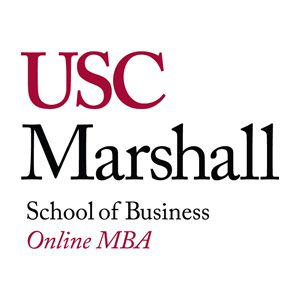
In 2017, for example, the USC Marshall School of Business collaborated with IBM to teach students virtual collaboration skills. Students were given a group project with one big caveat: They would never meet other members working on the project in person. USC worked with IBM to create an online collaboration platform, so that students could work together remotely.
“Once we moved to a single collaboration platform using the IBM Connections tool … all of a sudden, they’re in this single space,” said Peter Cardon, Academic Director and Professor at the USC Marshall School of Business. “They’re integrating their work. There’s this level of accountability. And they can see what one another are doing to really contribute to the project, and that dramatically improves their ability to produce really quality results.”
According to Cardon, the success of the initial project created demand for similar initiatives designed to encourage collaboration among students across the world and from different cultures. This in turn shows how the skills taught by these initiatives as well as learnt intrinsically in top online MBA programs are critical for solving the challenges that inhibit the adoption of enterprise virtual collaboration.
USC’s Online MBA (OMBA) program provides additional examples of how virtual collaboration can be used successfully to solve real-world business problems. Courses are structured so that students participate in two live video sessions each week; this gives them opportunities to ask questions and more actively engage with faculty. The program also includes a one-unit course that focuses entirely on virtual collaboration, including best practices and technologies for enabling successful collaboration in the workplace. According to Miriam Burgos, Academic Director of the OMBA program, students are given opportunities to reflect on how the skills they learn through virtual collaboration influence their leadership and business expertise.
Students in the online MBA program must also work together to analyze and solve real-world business problems. In one of the first semester-long group projects, for example, students analyze data-driven business strategies. All the data and analytics for these projects are done and coordinated remotely by students from around the world. Each group must then virtually present their findings at the end of the semester.
“It’s incredible to see … how students from all over the world—from the U.S. to England to Dubai—are actively networking in an online environment,” Burgos told MetroMBA. “The live class sessions get them engaged with the coursework and each other, and they can take these skills outside the classroom. Students often tell us that what they learn in the classroom makes them stronger leaders in their workplaces … they start seeing an immediate impact on their careers.”
What Businesses Can Learn from the Virtual Classroom
Encouraging the use of virtual collaboration in business settings has historically been an uphill battle. For instance, many collaboration tools face limited user adoption because they do not offer a seamless transition between employees’ workflow and the collaboration tool; this will change as pressure mounts on businesses to embed collaboration functionality with existing tools and processes. Furthermore, a new generation of business professionals will have already gained proficiency in leading and managing online, collaborative projects; these professionals will be able to shift business processes to be more accommodating of virtual collaboration. At the same time, enterprise virtual collaboration will evolve due to several key industry trends, including:
• Communication channel variety: The number of potential channels for collaboration will grow. Some employees shine in face-to-face meetings, but others will shine most in virtual environments. The businesses that master digital transformation will provide a mixture of synchronous collaboration, such as real-time video meetings, and asynchronous collaboration tools, such as file sharing or cloud-based content management.
• Collaboration integrated with content and workflow: The best collaboration tools are only effective if users adopt them. This will push businesses to seamlessly integrate collaboration tools with project management and workflow tools so that collaboration can take place within existing business process and tools.
• Spontaneous Virtual Collaboration: One of the central challenges of virtual collaboration in the past is that it is difficult to mimic in-person experiences like spontaneous brainstorming sessions around the water cooler. Technology integration will help facilitate this; for instance, when chat and video call functionality is integrated with file sharing, it is much easier to discuss designs, plans or other documents while making changes in real time.
In the long-term, businesses will also have access to technology that dramatically alters the virtual collaboration landscape by placing emphasis on more realistic immersion and connection between employees. This is already starting to take shape in technology solutions. For example, platforms such as Cisco Spark VR allow teams to collaborate in full virtual reality environments. Many of these solutions remain in early access or beta testing stages. The solutions’ potential to connect employees across the world, however, is limitless. In the case of Cisco Spark VR, the platform creates virtual rooms where people can meet to share 3D images and documents.
Yet, the potential for these platforms extends far beyond meeting in VR spaces. Imagine a future where artificial intelligence makes video calling remote employees a seamless experience, with AI providing virtual name badges and getting rid of background noise automatically. It may be a while before we see full VR conference rooms, but if you want leaders who are at the cutting edge of virtual collaboration, it’s time to look inside the virtual classroom.
To learn more about the USC Marshall School of Business Online MBA, visit the Marshall website.
The 5 Highest Paying Marketing Jobs for MBAs
Marketing is one of the most popular career paths for an MBA—2.9 times as popular as other careers according to PayScale—and with good reason: about 69 percent of marketing MBAs report a high level of job satisfaction. Besides, marketing MBAs are paid well. While the starting median pay (with a max of five years of experience) is only $55,700, after ten years, pay jumps to $116,000—a 108 percent growth between starting and mid-career salary.
The question then is, “What are the highest paying marketing jobs for MBAs?” The answer isn’t as cut and dry as you would think. It varies significantly between companies, level of experience, location, and job type.
Companies Recruiting Marketing MBAs
Where you work can have as a profound of an impact on your pay as your actual job function. That’s because larger companies tend to pay higher salaries, and how a particular company views the marketing department can also influence how much they are willing to pay. Below are five of the highest paying marketing jobs, according to PayScale.
- Microsoft Corp: $95,146 – $152,605
- IBM Corp: $91,158 – $132,500
- Dell, Inc: $77,511 – $130,000
- Starbucks Corp: $115,436 – $121,097
- Amazon: $90,000 – $122,500
Experience
According to PayScale, experience plays a big role in how much you earn as a marketing professional. After graduating with an MBA in business and marketing, the average salary you can expect based on your years worked is:
- Less than one year: $54,721
- One to four years: $59,343
- Five to nine years: $81,097
- Ten to 19 years: $104,070
- Over 20 years: $124,631
Location
Where you work, can have a significant impact on what you’re worth. As always, large cities tend to pay more, but that’s still not always a guarantee. So, where are the most popular cities for marketing professionals and how much do they pay (average salary)?
- Seattle, WA: $119,266
- San Francisco, CA: $118,330
- Boston, MA: $104,217
- Dallas, TX: $100,237
- NYC, NY: $96,387

The Top MBA Marketing Jobs
There are dozens of different marketing positions that an MBA graduate can choose. If you’re looking to choose the highest paying marketing job, then you’ll want to choose one of the following five jobs. These are the top salaried positions for marketing MBAs (just be sure to keep in mind the company, location, and your experience if you want to earn the most money).
-
Vice President Marketing ($100,000 – $186,000)
As a Vice President of Marketing, you will offten be responsible for reporting your company’s marketing efforts to the board of directors or other highly-placed executives. Your main responsibility will be to determine the best strategies to improve your market-shares for goods and services sold. You’ll also be responsible for your company’s brand, including presenting the company’s assets and products. Common tasks include:
- Forecasting and strategic planning.
- Directing and setting the strategic direction of the marketing program.
- Overseeing all marketing staff operations, policies, and plans.
For MBA graduates, becoming a VP of Marketing is the highest paying position you can attain. On average, you’ll earn $143,571 plus a bonus between $4,939 and $49,935. As for where you’ll get paid the most, look for jobs in:
- San Francisco: 21 percent more
- Charlotte: 11 percent more
- Boston: 10 percent more
-
Marketing Director ($66,000 – $158,000)
Marketing Directors are responsible for managing and directing all marketing tasks. You’ll oversee the many marketing professionals under your purview and ensure that they meet company goals, requirements, and needs. In addition, you’ll be responsible for developing marketing projects, running successful marketing campaigns, monitoring budgets, resolving team issues, and communicating with clients, vendors, and other team managers within your company. Common tasks include:
- Overseeing marketing staff, advertising budget, and business planning.
- Directing and planning marketing strategies.
- Acting as the marketing subject matter expert.
On average, a Marketing Director with an MBA can expect to earn $106,684. However, that salary can greatly increase depending on the company you work for. The top companies are:
- Medtronic, Inc: $175,000
- Microsoft: $164,848
- IBM: $147,215
-
Senior Marketing Manager ($73,000 – $147,000)
As a Senior Marketing Manager, you’re in a middle-management position. Typically, you report to the Marketing Director and are responsible for researching target markets, providing feedback on product development, running product teams, planning display marketing, and working with various other teams to develop marketing objectives and goals. Common tasks include:
- Managing training and development of marketing staff.
- Managing and analyzing marketing programs for optimized results.
- Developing, recommending, and implementing marketing programs and campaigns.
On average, you can expect to earn $111,476. To earn the most, you’ll want to look at jobs at:
- Microsoft: $138,598
- Medtronic, Inc: $128,104
- Amazon.com: $126,774
-
Brand Manager ($68,000 – $132,000)
As a Brand Manager, you’ll be responsible for many of the customer-facing operations in the marketing department. Your job will be to control and manage all the ways that the company is exposed to the public including consumer attitudes, staff communication, and more. Common tasks include:
- Leading the brand strategy.
- Researching customer attitudes and developing plans and projects to support positive experiences.
- Leading consumer communication in each marketplace.
On average, a Brand Manager earns $102,309 as an MBA graduate with a yearly bonus between $795 and $19,644. To earn the most money, you’ll want to work in:
- San Francisco: 41 percent more
- Seattle: 36 percent more
- Chicago: 16 percent more
-
Product Marketing Manager ($60,000 – $130,000)
A Product Marketing Manager knows the company’s products inside and out. They are responsible for conducting research and determining a strategy for selling each product to generate the highest revenues. You’ll also be responsible for overseeing how each product is seen by the public from advertising to press releases and more. Common tasks include:
- Developing product marketing strategies to maximize revenue.
- Researching consumer opinions on products to aid performance.
- Collaborating with design to meet consumer expectations.
On average, a Product Marketing Manager will earn $105,942, which is pretty consistent between companies. The best paying companies are:
- Google: $115,723
- Microsoft: $115,481
- AT&T: $112,020
A Look At New York’s Best Real Estate MBA Programs
In 2017, the United States Commercial Real Estate Services group (CBRE), listed New York City’s real estate investments markets among the three largest in the world, sandwiched between Tokyo and Los Angeles. This makes New York City the perfect place to learn about the multi-faceted, constantly-evolving field of real estate. For aspiring MBA’s interested in pursuing real estate, we’ve laid out some of the best New York real estate MBA programs the metro has to offer.
The Best New York Real Estate MBA Programs
Columbia Business School
The oft-celebrated Columbia Business School MBA Real Estate Program emphasizes finance and investment management, headquartered at the Paul Milstein Center for Real Estate. There, according to the school, students will gain an education focused on “capital markets, entrepreneurship, and global business.” Since many of Columbia’s alumni remain in New York metro, the school has access to a large network of professionals to engage in speaking events, panels, and mentorship with current students. Students in this program must take Real Estate Finance, which the school considers the Real Estate program entry course. Students then take nine credits of real estate electives.
The Real Estate Private Equity class lets students gain real-world experience. Groups of students work with industry sponsors to develop a business plan and present their final projects to a panel of professionals. Given the hands-on private equity and investment experience provided by this course, it makes sense that in 2017, 46 percent of students who graduated from the MBA Real Estate program went on to careers in Investment Management/Private Equity.
Nearly 4 percent of the most recent MBA class from CBS entered the New York real estate industry, earning a median income of $120,000 per year and, of course, heavy amounts of extra compensation. These graduates earned positions at notable real estate firms, such as: Drake Real Estate Partners, GLL Real Estate Partners, Greystar Real Estate Partners, LLC, Summit Real Estate Group, LLC, TKF Real Estate Investment LLC, and Trilogy Real Estate Management.
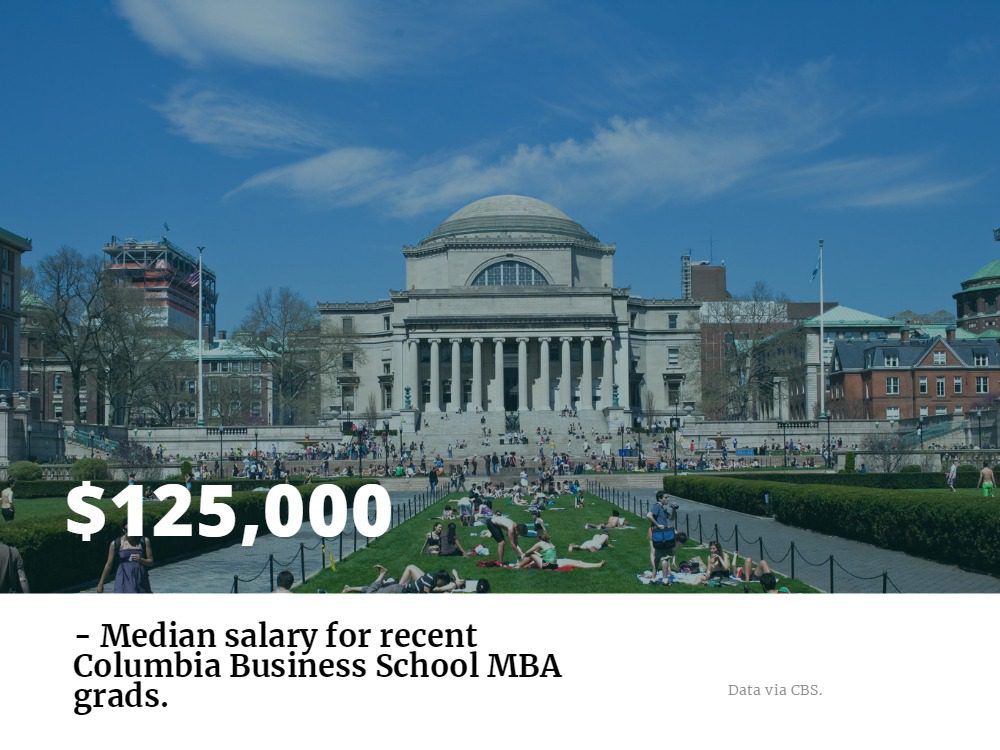
SC Johnson Graduate School of Management – Cornell University
At the Cornell University SC Johnson Graduate School of Management, students can pursue a dual degree in real estate and business administration. The MPS in Real Estate/MBA is a collaboration between Cornell SC Johnson’s School of Hotel Administration and Johnson. The dual degree spans six semesters (three years), and includes two summer internships. The first year of the degree is in either the real estate program or the MBA program, but students can take courses in both programs in the following semesters.
Students pursuing real estate at Cornell benefit from access to the the Cornell Real Estate Council, which the school promotes as “one of the largest university-based networks of real estate professionals in the world.”
YOU MAY ALSO LIKE: Finding the Best Real Estate MBAs in Los Angeles
Rutgers Business School, Newark and New Brunswick
The Real Estate Concentration at the Rutgers Business School in Newark and New Brunswick, New Jersey, has several objectives. The curriculum is geared toward arming students with the ability to assess investment risks in real estate markets, determine the best way to utilize a property based on market and demographic information, and gain a thorough knowledge of the legal intricacies involved in real estate. In addition to their elective and core MBA courses, b-schoolers with a real estate concentration are required to take the following courses: Aggregate Economic Analysis, Real Estate Development, Real Estate Law, and Real Estate Finance.
Stern School of Business – New York University
Any discussions of the best business schools in New York metro, and perhaps the world, are likely to include mention of the NYU Stern School of Business. Stern’s MBA with a Real Estate Specialization helps students understand the intricacies of real estate markets, financing real estate projects, real estate development, and managing real estate investments. The curriculum includes courses like: Real Estate Development and Entrepreneurship, Urban Systems, and Real Estate Investment Strategies.
One major perk of Stern’s program is its flexibility; Stern MBA’s can select up to three specializations, so students are not limited by their choice. Real estate is a vast field, with a multitude of facets. MBA’s interested in New York real estate might choose a secondary specialization to complement their specific interests, such as entrepreneurship and innovation or marketing.
Cornell Alum Supports Cornell Tech NYC Intensives with Substantial Gift
More students at Cornell’s Johnson Graduate School of Management have been able to spend a semester of their time in business school studying at the Cornell Tech campus in New York City thanks to a generous gift by Cornell alumnus Richard G. Schneider (B.S. ’70).
The gift went toward subsidized housing costs for around 25 Ithaca-based students who took part in Cornell Tech’s New York City fintech and digital marketing intensives. The intensives took place during the first seven weeks of the spring 2018 semester and offered MBA students the chance to collaborate and learn from each other in the heart of the Big Apple.
Schneider has spent 35 years in consulting, 25 of those at Deloitte Consulting LLP. At Deloitte his primary focus was on the consumer products and healthcare/life science industries, but he also led the firm’s consulting strategy practice for seven years and was responsible for all MBA campus recruiting for five years. Although his MBA is from Harvard Business School, he served on Johnson’s Advisory Council from 2006 to 2014 and remains an emeritus member.
He saw his gift as an opportunity to give back to Cornell. “I had been involved with Cornell in various ways,” he said in a news release, “but this gave me a chance to play in an area that I knew a lot about—the business school world. It just gave me a chance to give back to the school and really feel like I was contributing.”
Schneider’s decision to invest in the New York City intensives was due in part to Johnson Dean Mark Nelson’s assessment of where Johnson needed help. Nelson explained how crucial it was to make it easier for Ithaca students  to participate in and benefit from Cornell Tech in New York City. One of the most significant barriers was affordability.
to participate in and benefit from Cornell Tech in New York City. One of the most significant barriers was affordability.
Schneider’s contribution helped to make it easier for Ithaca MBA students to relocate to New York City for half a semester. It was good news for a program that has captured the imaginations of Cornell students since its inception.
According to Cristina Chang (MBA ’18), who completed the fintech intensive this spring, it was one of the most rewarding scholastic experiences she’s had so far.
“There are lots of events co-hosted by Cornell Tech and other organizations, such as the Women in Venture Capital symposium co-hosted with Bloomberg,” she explained. “I never imagined I would have these kinds of opportunities to meet these outstanding leaders in person.”
Julia Heim (MBA ’18) had a similar experience in the digital marketing intensive. “Being so close to the industry in NYC has allowed our professors to get great companies and speakers to campus,” she said. “Having access to the latest trends and industry knowledge is something that is so invaluable, and I am grateful for having had the opportunity to be part of this intensive.”
Overall, Schneider is excited about the opportunities that Cornell Tech presents for students and believes that it “could be the biggest thing for the university … for decades.”
This article has been edited and republished with permissions from our sister site, Clear Admit.
What Are the Fastest MBAs You Can Earn in Houston?
Even if you’ve just started the process of choosing an MBA program, you’re probably already aware at the extreme variety in programs throughout the country. Just within one school, you might find MBAs that can be pursued full-time, part-time, online, on the weekends, in the evenings, and maybe even more.
What’s clear is that business schools understand the diversity of their students, and know that their program is a stepping stone to future career growth and success. And if students are willing to put in the work, schools are willing to cater to their goals and get that degree in hand as quickly as possible.
In Houston, Texas—as in metros across the country—it’s possible to earn a quality business education much faster than the typical, two-year full-time degree.
Finding the Fastest Houston MBA
Rice University – Jones Graduate School of Business
If you are an experienced professional who has already spent several years in the workforce, Executive MBAs—designed for professionals at the executive level—tend to be quicker degrees to earn than most. At the the Rice University Jones School of Business, the EMBA can be earned in just 22 months on alternating weekends. This also includes four week-long executive forums and a mandatory international forum. Given the low commitment during the week, this degree is perfect for working professionals who want to keep their jobs while still earning their degree quickly overall.
The Jones EMBA focuses on three main skills: leadership, strategy, and decision-making. Focusing on these three skills as crucial to executive success, the degree will build from a solid foundation of business knowledge and place all learning in a global context. EMBA students also have access to the Career Development Office at Jones, with works alongside students and alumni to meet their professional development goals.
Cameron School of Business – University of St. Thomas Houston
The MBA at St. Thomas Houston’s Cameron School of Business offers students the unique opportunity to design their own MBA program from the ground up, including how long they wish to be enrolled. While availability of various courses may ultimately determine how long a program takes, students with the drive can complete their degree in as little as one year (a fall, spring, and summer semester). To get an idea of how the required courses would break down for each semester, students can explore using Cameron’s interactive MBABuilder tool.
Overall, the Cameron MBA will require 36 hours of graduate level courses, which breaks down to 27 hours of core business classes, and nine hours of electives. Cameron offers nine concentrations for students to choose from if they decide to focus their degree, including one in Health Care Administration as a partnership through Texas Woman’s University. Find out more about the Cameron MBA here.
Mays Business School – Texas A&M University
The Texas A&M Mays Business School full-time MBA program takes just 18 months to complete, beginning each year in August. Since the program is just three semesters (fall and spring in year one, no required classes during summer, and a third and final semester the following fall), students can complete their degree in a year-and-a-half, with an open summer to pursue internships or other professional development opportunities. Students who wish to continue their program also have the option of a fourth semester in spring of year two, but this is entirely optional.
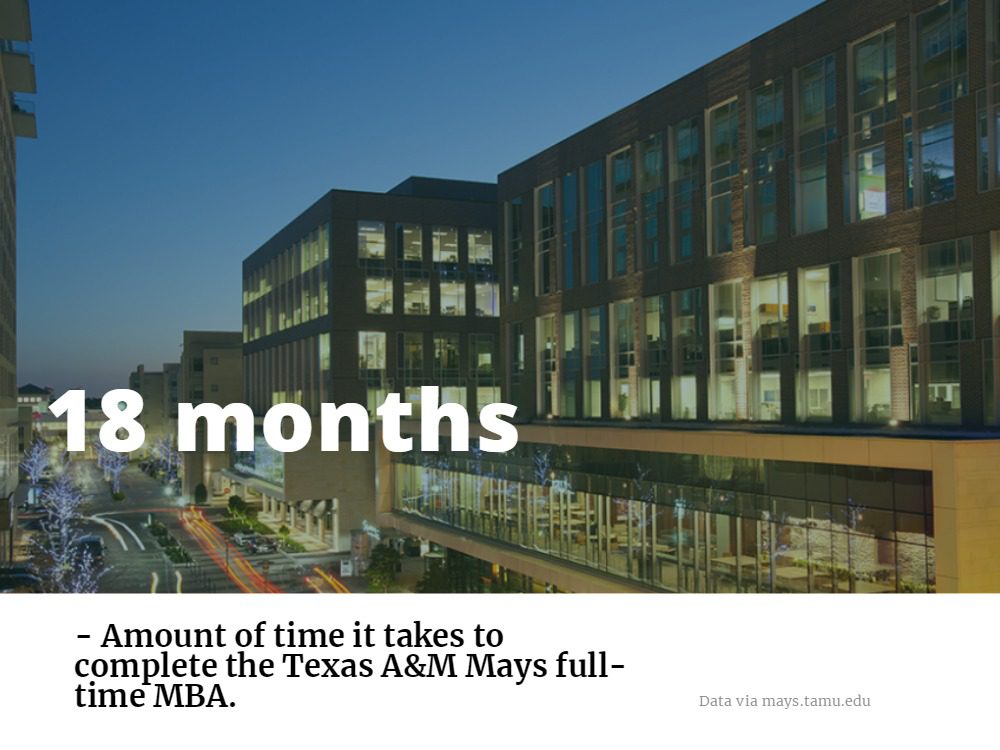
The full-time MBA at Mays is a rigorous program that offers students a unique and demanding educational environment, providing small cohorts and individualized attention for students, both from faculty and the school’s Career Management Center. The MBA program places an emphasis on preparing students for the workforce through experiential learning, offering students the chance to customize their degree through special certifications, electives, and study abroad opportunities.
University of Houston – Downtown
The Marilyn Davies College of Business at the University of Houston-Downtown offers students the chance to complete their degree in one, two, or three years. The focus of the Marilyn Davies MBA is for students to not put their professional careers on hold while earning their degree, and this is aided in UHD’s One Year program by allowing students to pursue the degree in a hybrid structure, both online and face-to-face. Students will complete their degree in one calendar year, taking classes three nights a week in this blended structure. Depending on the concentration, students may be required to complete 34-39 semester hours for their degree.
Students choose the UHD MBA for a number of reasons, including one of the lowest tuition rates in Texas, the flexibility of evening classes, and a modern and corporate driven curriculum. The school also offers a number of diverse concentrations for the degree, such as project management & process improvement, supply chain management, and investment management, among others.
Admissions Tip: How to Reapply to Business School
Consulting expert Alex Brown from Clear Admit recently offered up four incredibly valuable tips for potential students who want to reapply for a business degree, which you can read below.
With many MBA programs getting close to being ready to release their final round decisions, the application season will soon be coming to a close. While we would like to hope that today’s topic isn’t apropos for too many of our readers, we wanted to offer some advice to applicants who’ve been rejected from their preferred programs and are planning on reapplying next season. While it’s important to take some time to deal with the disappointment, it’s never too early to begin thinking about the next season, and there are a number of steps you can take to improve your candidacy and move toward a stronger application.
Reevaluate.
While it’s certainly difficult when things don’t go as planned, this is actually a great chance to take stock of your career and goals and to make sure that an MBA is still a logical and necessary step at this point. It’s this sort of reflection that can lead to refined career goals and a clearer sense of the reasons you need a business education.
Revisit your applications.
Once you’ve gained some distance from the emotional and time-consuming application process, it’s wise to review the materials you submitted to the schools with a critical eye. Having learned much about the process simply by applying, it’s likely that you’ll be able to identify a number of things that you could have done better. Whether you suspect your downfall was something like a strategic misstep in an essay or interview or a more glaring weakness like a low GMAT or lack of extracurricular involvement, there is plenty of time to address your shortcomings before submitting an application next year.
Consider your data points.
Your results this year may reflect some valuable information about your competitiveness at a top program. It’s important that you only apply to schools that you would be happy attending, but if you were unsuccessful at all of the programs to which you applied, it might be time to think about how realistic your list of target schools was and to add a few more to the mix. This is especially true for applicants who only applied to one or two programs this time around; there is an element of randomness and luck in the admissions process, and no matter how qualified the applicant, we recommend that a candidate target four to six programs to have a strong chance of success.
Schedule a feedback session, if applicable.
While it’s possible that you’ve identified your weaknesses in retrospect or even were aware of them when you went into the process, if you’ve been denied by a school that offers feedback to applicants and are planning on reapplying, you should absolutely take advantage of this opportunity to learn of the adcom’s perspective and demonstrate your commitment to the program. In fact, reapplying without seeking feedback when offered can raise questions for the adcom about how seriously an applicant is taking the process and the school. Of course, some schools do not offer feedback to anyone and others, such as Tuck, selectively offer feedback only to particularly promising candidates. There is naturally high demand for this service at programs that provide slots on a first-come, first-served basis, so it’s important that you make a point of requesting a feedback session at the earliest possible time.
School v. School: Berkeley Haas or UW Foster?
With all the options for incredible business schools throughout the country, it can be a tall order to narrow down programs and choose the right degree for you. In our School v. School series, you can compare and contrast some of the best programs around the United States, helping to cut through the noise and find the best MBA for you on the West Coast.
Harvard Faculty Discuss Recent Chinese Tariffs, and More – Boston News
Let’s explore some of the most interesting stories that have emerged from Boston business schools this week.
Trade War or War of Words? – Harvard Business School Blog
Following the Trump administration’s recent announcement of 25 percent tariffs on 1,000 Chinese exports, Bill Kirby and Willy Shih, Harvard Business School faculty experts on China, took to the HBS blog to “trade theories on the best path forward for the world’s two largest economies.”
Both experts point to economic shifts in the 1980s, which, not incidentally, was the decade in which Donald Trump started to become a household name. Kirby notes that the major trade distinctions between the United States and Japan, specifically regarding the auto-manufacturing industry, set a precedent. In that, the United States began to firmly invest in Japanese car companies like Honda and Toyota, building their own domestic manufacturing plants. Kirby suspects, however, that the Trump administration may not be as open to that kind of investment. “If Chinese companies wanted to improve access to American markets by investing in the US, would the administration be open to it?” he asks. “They ought to be, in my view. But my suspicion is that that’s not the outcome that this administration is looking for. They’re looking for a miraculous recovery of American-based manufacturing exporting to a Chinese market, not a particularly good match.”
Shih, staying on the topic of the ’80s, offers a different opinion, saying; “I think the real issue is industrial policy on the Chinese side competing with a lack of industrial policy on the U.S. side and the consequences of that. Going back to the mid-1980s, the Chinese government has been mapping a pathway for the country to become a modern country (just as the Koreans, Taiwanese, and the Japanese did before, except on a much larger scale). The Chinese have identified core capabilities that they want to see inside the country, and they’ve been methodically working on that over the last 30-plus years. I’d argue the positive trade balance with the US reflects the progress they’ve made.”
You can read the full conversation between Kirby and Shih here.
An Easy Internship Trick from Kayla Humel ’18 – Simmons Blog
Current Simmons School of Management student body president Kayla Humel, ’18, wrote candidly about the impact of the Student Government Association (SGA) on her recent internship at Puma and future career plans.
“First and foremost, [SGA has taught me] the power of good communication. When the e-board is communicating with one another, event planning is exponentially easier. When SGA is communicating with organizations, processes like budgets occur seamlessly. Good communication is crucial to success in any organization.”
Humel threw her hat in the presidential race because she “saw opportunities to improve processes between SGA and the other organizations on campus. I knew that SGA could create change on campus and I wanted to play a major part in that.”
You ca check out more about her Simmons experience here and watch an interview with Humel about her internship below.
Wield Polarization to Build Positive Change – MIT Sloan Newsroom
MIT Sloan School of Management sustainability initiative director Jason Jay used his recent TEDx talk as an opportunity to share some strategic advice on how to more effectively spark difficult conversations. “The voltage feels so high that we simply avoid conversations out of fear of getting shocked. But I like to think about that polarization as a kind of energy.”
- Draw a contrast between what others might expect you to do and what you’re really trying to do.
- Clarify the values underlying your positions, and do the same with the people you’re talking to.
- Make it clear that you aren’t meeting simply to bargain over these values, but to embrace tension and find new ideas.”
You can check out Jay’s TEDx talk at Hofstra University below and learn more about his work here.
What’s It Like to Earn Your MBA in Canada at McMaster’s DeGroote School?
Hockey, maple syrup, the friendliest people you’ll ever meet … all reasons to love Canada. But have you ever thought to earn your MBA in Canada?
More often than not, when MBA candidates think about where to go to school, they tend to scour the U.S. for the best programs. Occasionally, they’ll expand their reach overseas to the top programs in the UK and Europe, but often Canada is overlooked; and that’s a mistake. Canada has become an international destination for MBA students looking for an affordable education with an excellent reputation.
Canadian MBA programs offer many of the same opportunities as U.S. programs, but with some surprising benefits. To get a better idea of what it’s like to go to school in Canada, we talked to Bach Dang, a ’19 MBA student at McMaster University’s DeGroote School of Business. Continue reading…
In Search of the Best Chicago Internships for MBAs
Chicago is an ideal place to earn an MBA. In addition to having some of the strongest business schools in the country, the Chicago area is home to nearly 40 of the Fortune 500 companies. The bustling metro is also the financial and cultural hub of the Midwest, making it an ideal place for major corporations to set up large outposts. This means a wealth of internship program opportunities for MBAs at the start of their careers. So, for those with the gusto to live in the gustiest metro, the rewards can be huge. Below, we’ve laid out at which companies Chicago MBAs most often seek internships with.

Given Amazon’s involvement in nearly every industry, it is no surprise that the company is on the hunt for innovative MBAs to help maintain its dominance and status as the world’s greatest internet retailer. The mammoth corporation assigns interns a project for which they will partner with clients to glean true insight into the inner-workings of the company.
According to the Wall Street Journal, “Amazon took in more interns from the University of Chicago’s Booth School of Business than either Bain & Co. or McKinsey & Co., which were until recently the school’s top hirers of interns …” Amazon also offers many interns the opportunity to come back to work at the company full-time.
Just last year, Amazon was a major player in hiring Chicago Booth School of Business MBA graduates and interns. Twenty-six graduates managed to earn a full-time job with the company, while an impressive 33 interns joined its ranks, which was the single highest total among all companies that employed Booth interns.
The companyalso brought in students from nearby Indiana. Several Class of 2018 MBA students from the Notre Dame University Mendoza College of Business earned vital internship program experience at Amazon, which often leads to direct hiring.

Many of the companies hiring MBA interns offer exposure to retail, tech, and financial services, or consulting. But Abbott Laboratories, headquartered in Lake Bluff, Illinois, is a popular internship destination for MBAs interested in pursuing a career in pharmaceuticals. The Commercial MBA Internship allows interns to get their foot in the door of this massive and growing industry.
Several MBAs at the Kellogg School of Management at Northwestern University joined Abbot Laboratories, according to the school’s most recent employment report, joined the company’s summer internship program.

Deloitte, which has a Chicago office located right near the iconic Willis Tower, employs 40,000 people in the U.S. The company’s Client Service Internship can take place throughout the course of a semester or over two months during the summer. Consulting tends to be a popular area of focus for MBA grads, but Deloitte also offers a plethora of opportunities for advanced degree students interested in financial sectors such as auditing and tax. Depending on their interests and professional backgrounds, interns can join a client service team in Deloitte & Touch LLP, Deloitte Tax LLP, Deloitte Risk and Financial Advisory, or Deloitte Consulting LLP. According to The Balance, summer interns at Deloitte can make anywhere from $3,850-$12,000 per month. Deloitte also made Fortune’s list of “25 Top MBA Employers.”

Around 50 percent of McKinsey & Company’s incoming hires have MBA degrees, so business school recruiting is a high priority for the mega firm. The consulting giant—which now has over 120 offices worldwide—was actually founded in Chicago in the 1920s, so it makes sense that the company is one of Chicago metro’s most active MBA recruiters. Though gaining entry to the elite consulting firm is extremely competitive, both University of Chicago’s Booth School of Business and Northwestern University’s Kellogg School of Business have been able to claim the company as one of the top places their MBA students land for internships and full-time employment after graduation.
In fact, no company hired more Booth grads than McKinsey and Co. The company managed to snag a staggering 48 employees from the business school last year, which accounted for nearly 10 percent of the entire Booth MBA Class of 2017. Not so surprisingly, McKinsey also brought in 26 Booth interns within the same year—the second most among any employers in that time frame.
So, what should an MBA at in the McKinsey internship program expect? According to the firm’s website, MBA interns “… join us as associates, working either as generalists or practice consultants if they have and area they’d like to focus on.”
Finding the Best Real Estate MBAs in Los Angeles
Over the past few years, MBA programs and courses in real estate have seen continued growth, as both interest and need have become undeniable throughout the country. With property values and real estate often having a tremendous impact on the overall economic health of the nation, educating and placing top talent in this sector can be vital. But how can you turn a valuable MBA into a lucrative career in Los Angeles real estate?
Although a business focus on real estate is nothing new, the idea of MBAs concentrating in the industry as part of their degree has been getting increasingly more popular. It is somewhat difficult to find MBA programs that offer specializations in the field, even though 2017 saw more than $5 billion invested into real estate technology—a massive increase since the Great Recession. Startups like Airbnb and WeWork area also changing the way the real estate industry overlaps with entrepreneurship and technology, making it even more important for a workforce of talented individuals helping to guide the industry going forward.
Los Angeles, long at the center of discussions about urban development and city planning, features some of the country’s most vital real estate business program. Take a look at the three of the best Los Angeles real estate MBA programs below.
Marshall School of Business – USC
USC’s Marshall School of Business allows students in the full-time MBA program specialize their degree in real estate through electives that focus on topics like investment, finance, valuation, law, development, and the economics of real estate markets. This degree will prepare students for a variety of careers in the Los Angeles real estate field, pairing a focus on the unique aspects of the real estate field with the acknowledgement that success in the real estate field relies still relies on fundamentals like management, marketing, strategic planning, and economics.
The USC MBA in real estate is unique in the student’s ability to tailor the curriculum to their own career and educational needs, acknowledging the wide variety of roles within Los Angeles real estate, such as investment and asset management, consulting, valuation, asset management, and more.
Below are just a few Graduate Real Estate courses offered for MBA students at Marshall:
- Mortgage-Backed Securities and Markets. This course, which includes lectures, assignments and a project, looks at residential and commercial mortgages as well as mortgage-backed securities and markets.
- Urban Land Use-Feasibility Studies. This course consists of a team field study analysis of a prospective development site. Students will work together with a client to address issues like design, entity choice, deal structure, land use, economic analysis, and allows teams to interact with industry professionals throughout the process of developing their proposals.
- Real Estate Finance and Investment. This course consists of both cases and lectures, as well as assignments and exams to evaluate student’s understanding of valuation, projects, financing, and investment analysis. Students will also learn to use ARGUS 7.0, one of the top real estate investment software packages used throughout the industry.
Anderson School of Management – UCLA
The real estate MBA focus at UCLA’s Anderson School of Management has consistently been named among the best real estate programs in the country, let alone Los Angeles. The real estate concentration at Anderson trains students to join the industry through a strong education in real estate financing, investing, and entrepreneurial development. The concentration is integrated into the school’s overall MBA program, with the option for many real estate-centered electives, providing both theoretical and practical study in the most important aspects of the industry.
YOU MAY ALSO LIKE: The Top 5 Schools for an MBA in Real Estate
The Anderson School of Management also recognizes that real estate is not just a matter of business, and encourages MBA students to seek classes in other departments at UCLA, including public policy, urban planning, architecture, engineering, taxation, and law.
Below are some popular electives available to Real Estate MBA students at Anderson:
- Urban Real Estate Financing and Investment. This course helps students to bridge the gap between theory and practice in real estate finance and investment, training students to use finance and economics to uncover insights about real estate markets and investments.
- Entrepreneurial Real Estate Development. This course looks at real estate through the lens of entrepreneurship, helping students identify market opportunity, product definition, and conceptual feasibility through work in an entrepreneurial environment.
- Public Policy Clinic: Land Use, the Environment and Local Government. Acknowledging the interdisciplinary nature of this field, this course will provide students with a solid education in the complicated connections between land use control, state and local government law, and environmental quality
The Paul Merage School of Business – University of California, Irvine
At the Merage School of Business‘ Center for Real Estate, students can earn an MBA Certificate in Real Estate and Urban Development, with a curriculum just as dynamic and diverse as the marketplace itself. The MBA certificate presents students with a holistic approach to real estate, using lessons from past trends and cycles within the industry to help students prepare for a career in this often volatile industry.
Students who have at least two years of study in a Merage MBA program are eligible to pursue this certificate after successful completion of certain prerequisites in real estate. After completing these courses, students can choose from a number of electives connected to the certificate, such as:
- Real Estate Capital Markets
- The Real Estate Development Process
- International Real Estate
- Applied Real Estate Security Analysis and Portfolio Management
- Practicum in Mixed-Use Community Development
Rotman Receives $6 Million Endowment, and More – Toronto News
This week, some of Toronto’s most prominent business schools have seen a wealth of exciting news (including actual wealth in Rotman’s case, in the form of a sizeable donation). We’ve rounded up some of the most exciting recent news from Toronto metro’s business schools.
Private Donations Give Specialty Programs a Shot in the Arm – The Globe and Mail
Over 20 years since the University of Toronto received a $15 million donation from the Rotman family, changing its name from the Faculty of Management to the current Rotman School of Management, the philanthropic family once again returned a sizable gift to the Toronto business school.
The new $6 million donation will boost the school’s healthcare management programs, according to the Globe and Mail. As well, the family gifted the school an additional $1 million to help “the reach of an award-winning program for Indigenous entrepreneurs.”
“The latest Rotman family donation is earmarked for three initiatives: recruitment of three faculty research chairs in artificial intelligence, life sciences commercialization and health economics and policy; scholarships for graduate students in health care management studies; and support for a new global executive MBA for health care and life sciences.”
You can learn more about the Rotmans’ donation here.
Schulich Researchers Analyze Canada’s Multicultural Marketplace – yFile
A new York University Schulich School of Business study from professors Ela Veresiu and Markus Giesler—“Beyond Acculturation: Multiculturalism and the Institutional Shaping of an Ethnic Consumer Subject”—found that “that Canada’s market-based form of multiculturalism fosters marketplace inclusion without resource redistribution, and maintains ethnic divides rather than uniting diverse communities.”
“We bring sociological theories of neoliberal governmentality and multiculturalism to bear on an in-depth analysis of the contemporary Canadian marketplace to reveal our concept of market-mediated multiculturation, which we define as an institutional mechanism for attenuating ethnic group conflicts through which immigrant-receiving cultures fetishize strangers and their strangeness in their commodification of differences, and the existence of inequalities between ethnicities is occluded,” said Veresiu.
You can read more about Veresiu and Giesler’s study here.
Investing Insights: Lessons from Tom Russo – Ivey Blog
Last month, Tom Russo, managing member of Pennsylvania investment firm Gardner Russo & Gardner, spoke with professor George Athanassakos’ value investing class at the Ivey Business School about his company’s investment philosophy, which broke down into three principles.
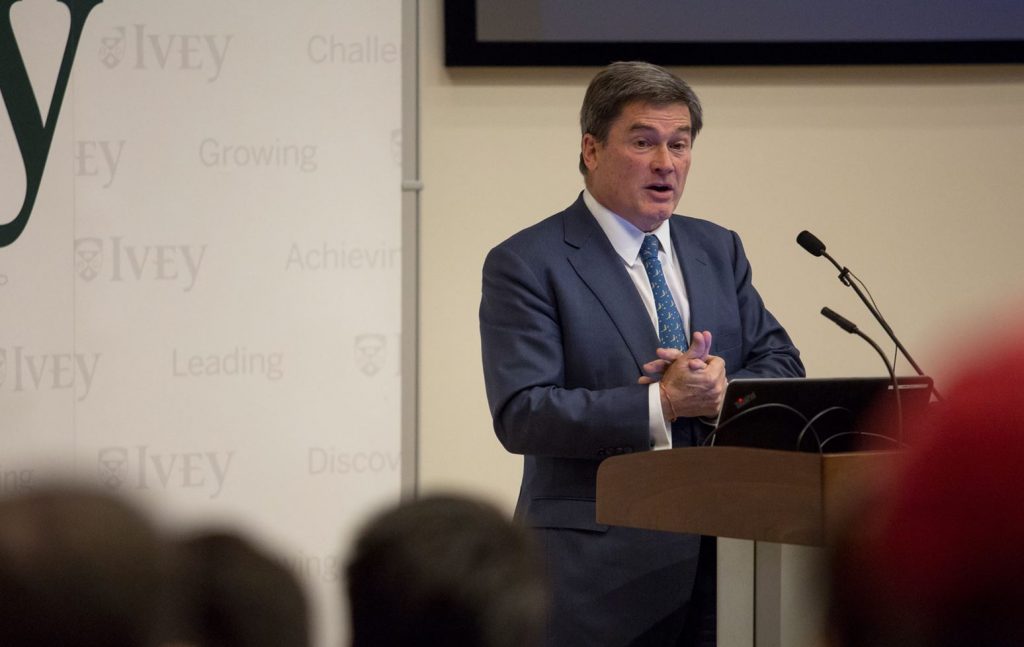
Gardner Russo & Gardner managing member Tom Russo / Photo via ivey.uwo.ca
- The capacity to invest
- The capacity to suffer
- The capacity do nothing
“Despite the long-term unattractiveness of holding cash, doing nothing may sometimes prove to be the right decision to make,” HBA and Computer Science dual degree candidate Leroi Yu writes on the Ivey Business School blog. Sitting on the sidelines instead of compromising on quality takes character. It provides optionality and may prove to be beneficial in the long-run.”
You can read more about Russo’s advice here.
What San Diego MBAs Offer the Best Return on Investment?
Attending a Master of Business Administration program in San Diego sounds like a great idea. There’s great weather year round, beautiful beaches, and you get to enjoy the laid-back California attitude. But do you get a good return on your investment (ROI) going to school in San Diego?
The ROI of your MBA program can be difficult to determine considering the many factors that come into play. Not only do you need to compare the cost of tuition and expected salary upon graduation from each school, but you also have to take into account the cost of living where you go to school and your salary change pre- to post-MBA.
In this article, we’re going to take a look at the best San Diego MBA programs to get the highest return on your investment.
Fowler College of Business Administration – SDSU

MBA students who chose to attend the Fowler College of Business Administration at SDSU can expect affordable tuition and decent job prospects. These MBA graduates have one of the best returns on their investments in San Diego.
Over 70 percent of the most recent Fowler MBA class had a job within three months of graduation, and that percentage increased to 82.94 percent at six months post graduation. MBA students who were employed found jobs at GEICO, EY, PepsiCo, HSBC Group, Qualcomm, and more.
Tuition
Tuition at Fowler is very affordable. In fact, full-time Master of Business Administration students who are California residents can expect to pay just $29,938 over the course of their degree—$7,223 a semester. Non-California residents can expect to pay a little more, approximately $47,758 over two years.
Salary
The mean starting salary for MBA graduates at Fowler is $61,467.
ROI
The salary-to-debt ratio for Fowler MBA graduates who are residents of California is .487, which means that Fowler MBAs can expect to pay off their debt in just the first year. For non-California residents, the ratio is .777, which is still less than a year to pay off the debt.
University of San Diego School of Business Administration
Choosing to attend the University of San Diego School of Business Administration is a fairly reliable choice for return on investment. 83 percent of MBA graduates can expect to be employed three months post graduation at top companies including Amazon, Deloitte, Intel, Bank of America, eBay, Boston Consulting Group, and 21st Century Fox. But what does it look like when you compare tuition to expected salary?
Tuition
Tuition is a bit pricey compared to the other San Diego business schools. For an MBA student, it costs $1,475 per unit with 56 units required. That equals around $82,600 for tuition over two years. In addition, MBA students can expect $1,153.50 a semester for health insurance coverage with approximately $200 in additional fees. Total, over the two years, MBA students can expect to pay $87,614 for tuition and fees.
Salary
Upon graduation, MBA students at USD can expect an average starting salary of $72,363 with a range of $50,000 – $100,000.
ROI
The salary-to-debt ratio for a USD MBA graduate is 1.21, indicating that it would take you only 1.2 years to earn back what you paid for the program if every dime of your salary went to paying off your tuition.
Rady School of Management – UC San Diego
The Rady School of Management is one of the more expensive Master of Business Administration programs in San Diego, at the same time it has some of the best job prospects. Three months post-graduation, 82 percent of Rady MBA graduates accepted employment, and 10 percent started their own business for a total employment rate of 92 percent. Those individuals accepted jobs at such companies as IBM, Boeing, Cisco Systems, Amazon, Tesla Motors, Ernst & Young, Gartner, and Deloitte.
Tuition
Tuition for full-time MBA students who are also California residents is $48,961 a year—$97,922 total. For non-residents, tuition costs $55,546 a year or $111,092 total. Other non-tuition fees including campus fees and health insurance can cost an additional $4,000 a year or $8,000 over the course of the program.
Salary
Rady MBA graduates, on average, earn $84,335 as a starting salary ($87,500 median).
ROI
The salary-to-debt ratio for the Rady School Master of Business Administration program is 1.255 for California residents and 1.41 for non-California residents.
Other San Diego MBA Programs
As for the three other Master of Business Administration programs available in San Diego, not much information is provided.
- Fermanian School of Business – Point Loma Nazarene University: The cost of tuition is $825 a unit for 42 units, for a total cost of $34,650 for twelve months. So, as long as you earn more post-MBA than $40,000 it’s a good investment, though little post-MBA graduation employment information is available.
- California International Business University (CIBU): CIBU costs approximately $26,000 to earn a full-time MBA. No employment information is provided.
- California School of Management & Leadership – Alliant University: An MBA at Alliant costs $698 per unit for a total of 36 to 42 units—$25,128 to $29,316 total. No employment information is provided.




















